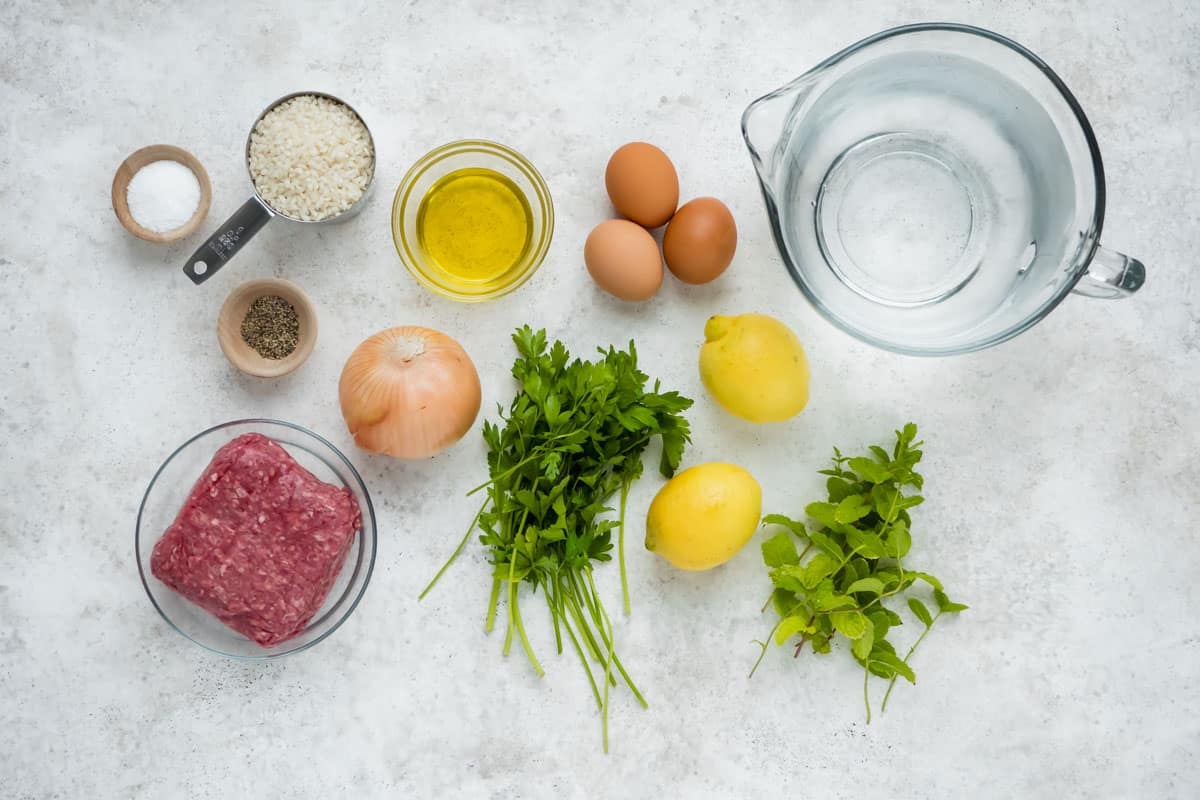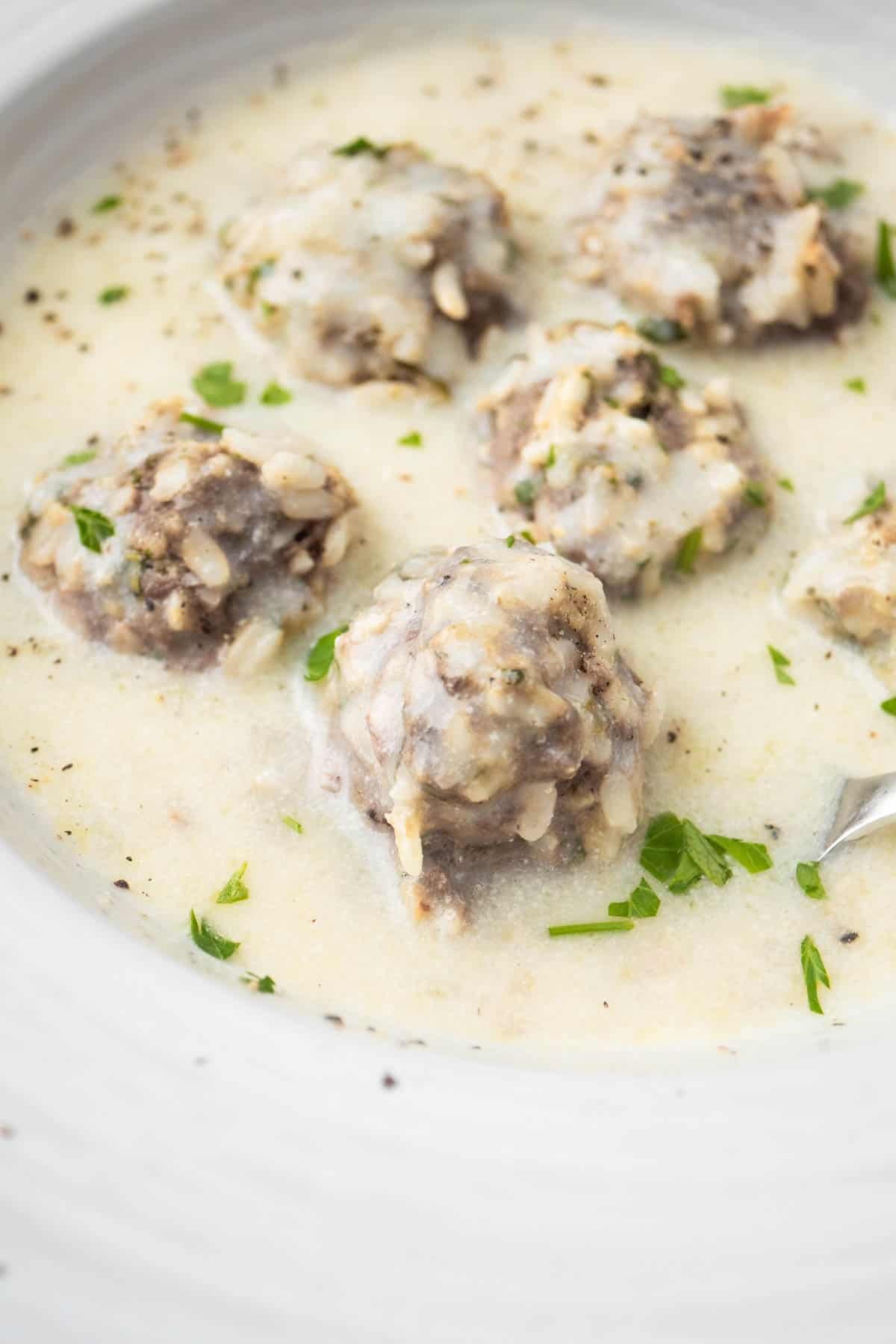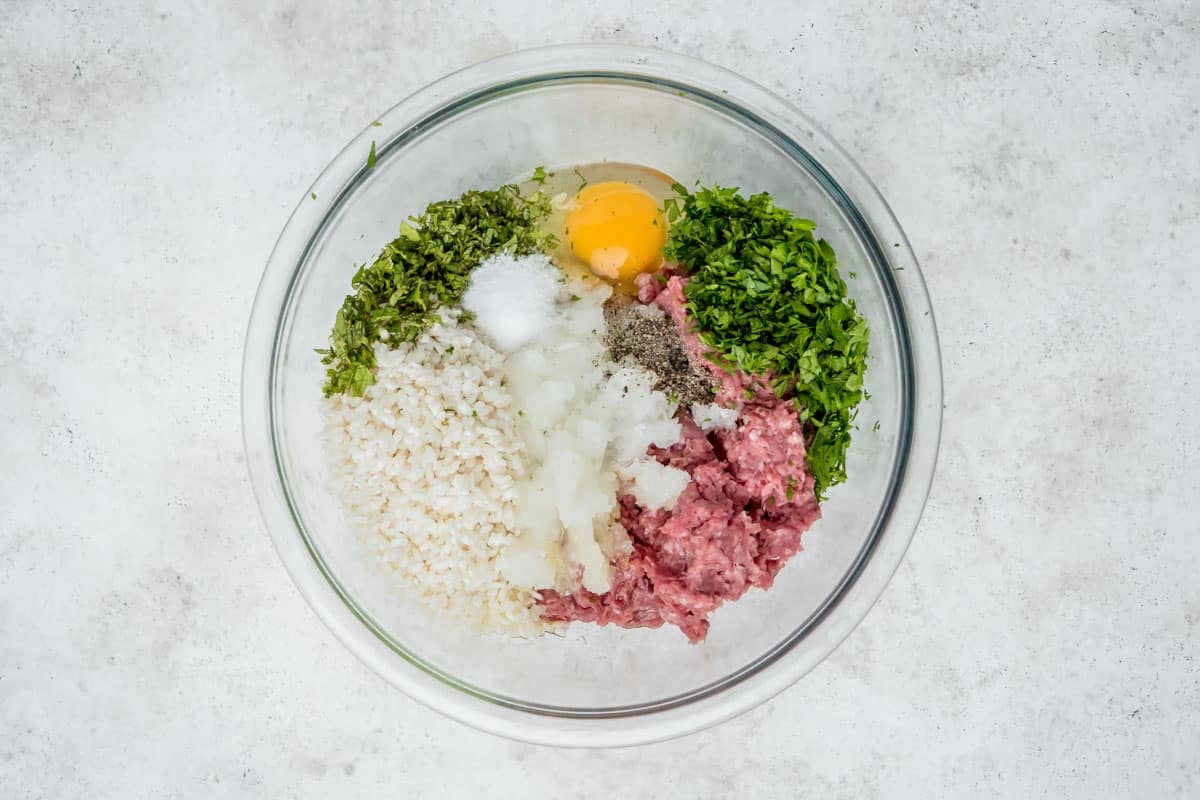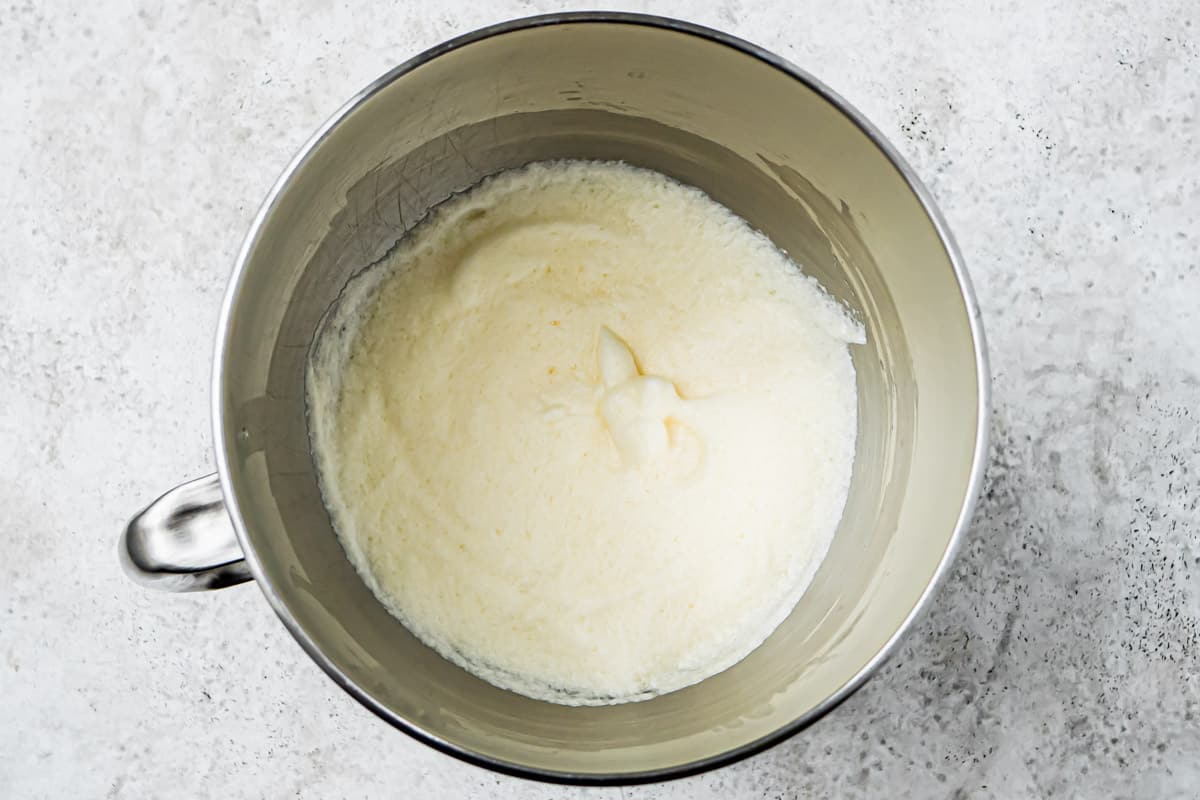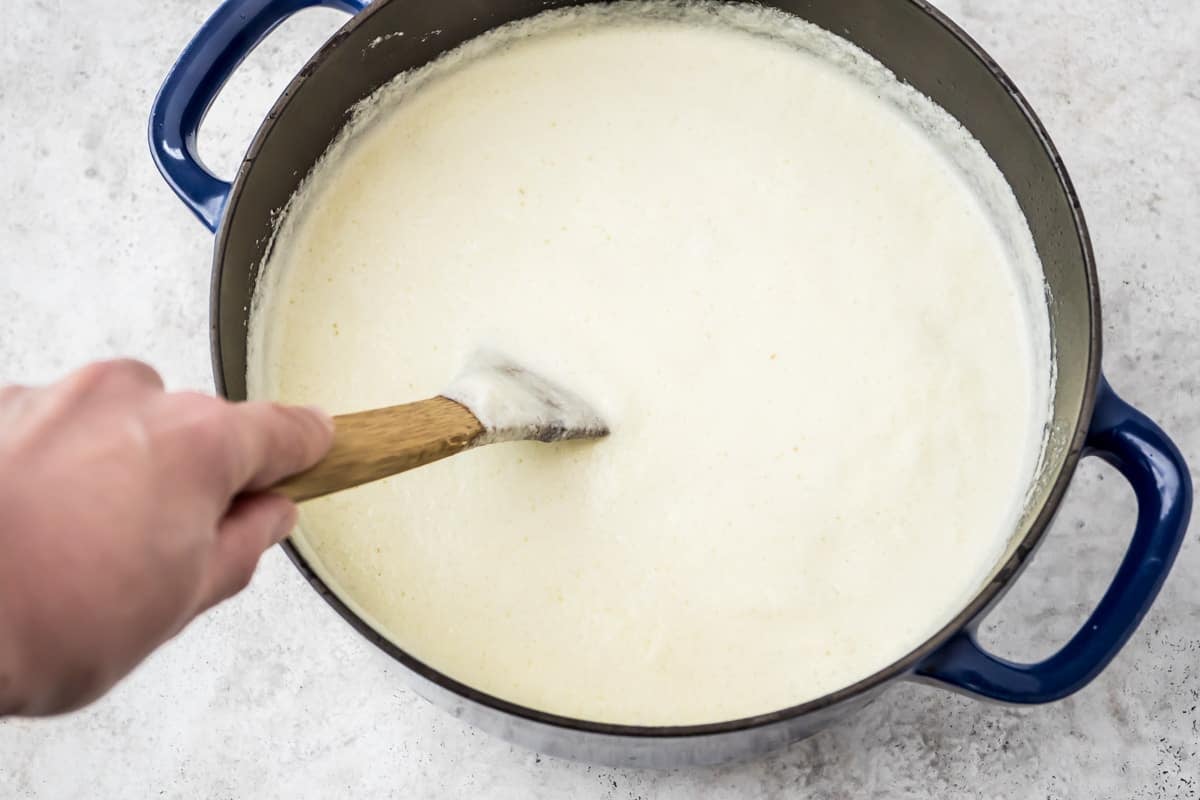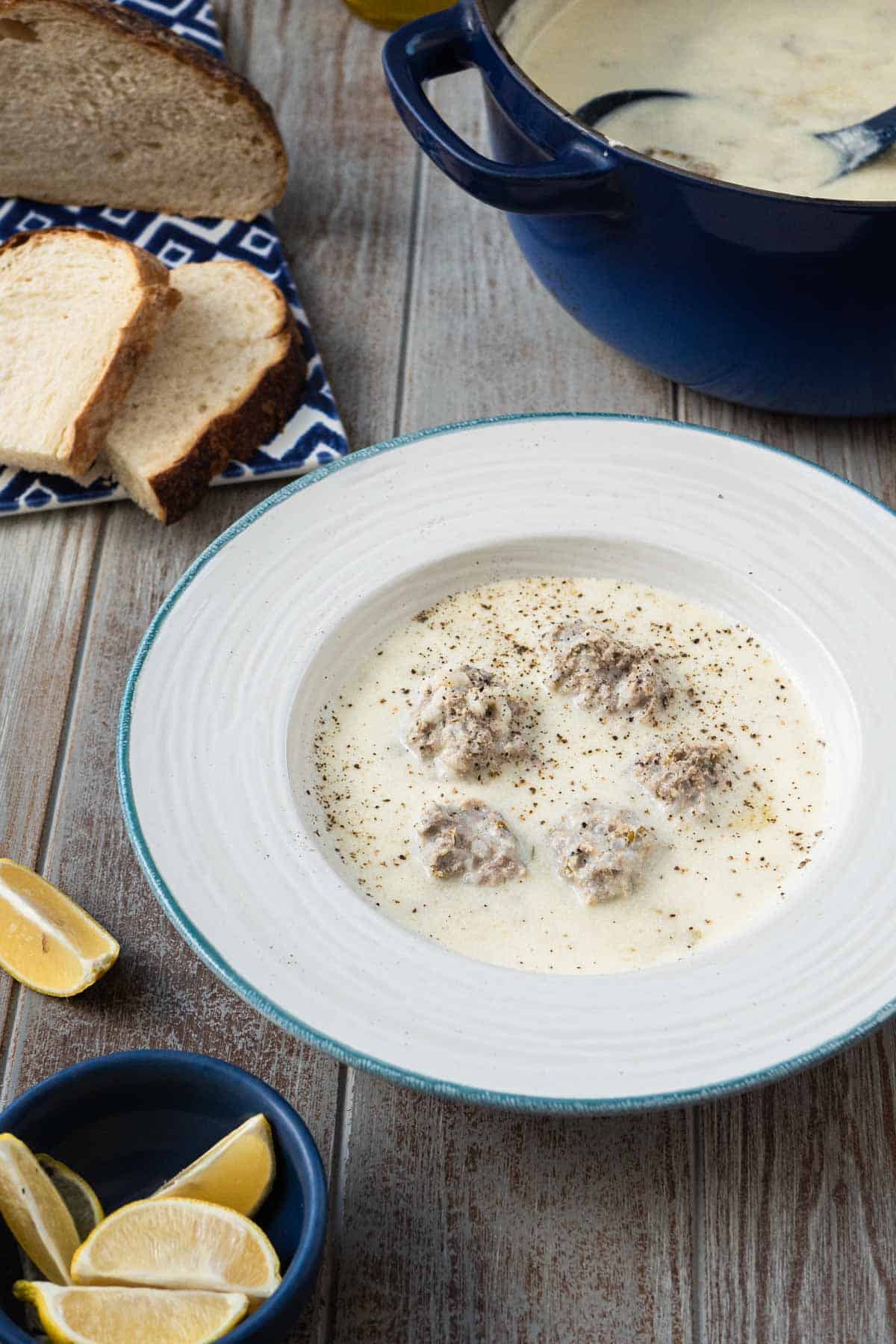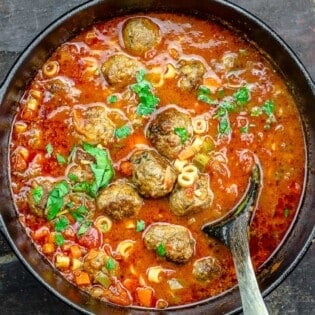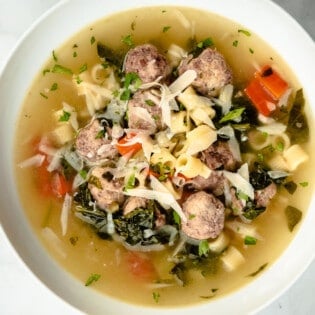Youvarlakia is Greece’s traditional meatball soup. It is both bright and light while also feeling hearty and comforting.I must confess—I eat this Greek meatball soup all year round. I know soups and stews are typically enjoyed in winter, but I could eat half a pot of this soup in one sitting regardless of the weather. During the summer, I enjoy it at room temperature with a squeeze of fresh lemon juice. During the colder months, I have it steaming hot. To make this meatball soup recipe, meatballs dotted with rice simmer in water then are finished with avgolemono (avgo (egg) and lemono (lemon)). The method is used in many Greek recipes, most famously the eponymous Avgolemono Greek Lemon Chicken Soup. In this case, the mixture thickens the soup, with the eggs adding a cloud-like fluffiness and the lemon adding a great tanginess.
Ingredients for Youvarlakia (Giouvarlakia)
This soup is budget-friendly, consists of very few ingredients, and comes together with only a few simple steps. Here’s what you need:
Olive oil: You cannot make a Greek soup without extra virgin olive oil. It enhances flavor and richness. Use the best quality you can find. Ground beef: I like to use lean beef, as it won’t release as much fat into your broth. You could substitute for half beef and half pork. Onion: White or yellow onion is best. Herbs: Freshly chopped parsley and mint add freshness and brightness and infuse the meatballs with flavor. Eggs: Eggs are the binding agent in this recipe, both in the meatball mixture and the broth. Salt and pepper: Enhances the flavor of both the broth and the meatball mixture. Rice: Small or medium grain rice, such as Arborio rice, remains plump and creamy when cooked. It’s commonly used to make risotto and is the best choice for this recipe. All rice contains starches called amylose and amylopectin. Long-grain rice has amylose, which does not break down in the cooking process. On the other hand, most short and medium-grain rice have amylopectin, which creates a creaminess and gelatine-like texture when cooked—the ideal rice for this soup. Lemon: Lemons give the soup tanginess and a vibrant taste. You can squeeze additional lemon juice just before serving. Whatever you do, do not reduce the lemon to less than two. Fresh lemon is key!
How to Make Greek Meatball Soup
When I started making avgolemono my husband would cheekily let off a little laugh and start making kissing noises while pouring the lemon egg mixture into the soup, and he would say, ”So your eggs won’t curdle!” I soon learned of an old wives tale that says making kissing noises while whisking eggs, will create a perfect soup with no curdling. A little bit of quirky Greek cultural flair never hurts in the kitchen!
Start the meatball mixture. In a large bowl, combine 1 pound of ground beef, 1 cup of uncooked rice, 1 grated onion, 1 egg, 1/4 cup of olive oil, and 1/2 cup each of parsley and mint. Season with 1 1/2 teaspoons of salt and 1 teaspoon of black pepper. Make the broth. Place 2 quarts of water, two tablespoons of olive oil, and one teaspoon of salt in a large pot. Bring to a boil, then reduce the heat to allow the water to simmer while you roll the meatballs. Form the meatballs. Mix the meatball mixture well, then roll approximately 40 small meatballs with your palms (they should each be a little smaller than a golf ball). Cook the meatballs. Carefully transfer the meatballs to the simmering water (if your pot is very wide, you may need to push them aside with a spoon as you go to make room). Allow them to simmer until they are cooked through, about 30 minutes. Make the Avgolemono. While the meatballs cook, separate 2 eggs, placing the whites in a medium bowl and the yolks in a small bowl. Whisk the whites until they are thick and fluffy but not too stiff. Juice two lemons into the bowl with the egg whites, then add the yolks and whisk until fully incorporated. It will look very thick and yellow, whisk vigorously to incorporate fully. Temper the eggs. When the meatballs have cooked through, take one large ladle of broth from the pot of meatballs and slowly drizzle the liquid into the egg and lemon mixture while whisking continuously. Repeat with a second ladleful of broth. Pour the egg and lemon mixture into the soup, while stirring. At this point, it should be foamy, still watery, and light yellow in color. Turn the burner off, cover the pot with a lid, and let the soup sit for about 10 minutes to thicken. Serve. Divide the soup among bowls and finish with freshly cracked black pepper. Serve with lemon wedges and, optionally, bread on the side.
A Note About Rice
The uncooked rice in this Youvarlakia recipe behaves just like breadcrumbs, absorbing the cooking liquid and releasing it back into the meatball to keep it tender and juicy. The rice also soaks in a lot of flavor, making these meatballs extra delicious! While adding uncooked rice to meatballs may seem unusual to some, the use of grains in meatballs is quite common in Greek and Eastern Mediterranean recipes, from basmati rice in Persian Koofteh to bulgur in Turkish Içli Köfte or Middle Eastern kibbeh. To make the meatballs in Youvarlakia, use small or medium-grain white rice like arborio or carnaroli, which cooks in unison with the meatballs to be perfectly tender yet toothsome. Avoid long-grain, like basmati or precooked, or instant rice as it will become mushy. I don’t recommend brown rice as it takes far longer to cook and will result in overcooked meatballs.
What to Serve with Youvarlakia
This Greek meatball soup recipe is filling enough on its own—with the rice, meat, and egg it’s really a whole meal in one. Crusty bread or pita are common pairings. If you’d like a starter, serve with a fresh crunchy salad, like traditional Greek salad. A glass of ouzo is also a welcome indulgence, as is Greek orange honey cake or Loukoumades for dessert. Browse all Mediterranean Recipes.
Avgolemono Soup Recipe (Greek Lemon Chicken Soup)
Meatball Soup
Italian Wedding Soup
Fasolada (Greek bean soup)
Visit Our Shop. Our Signature Private Reserve and Early Harvest Extra Virgin Olive Oils, Sourced Directly from Family Farms in Greece.




